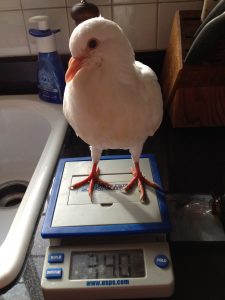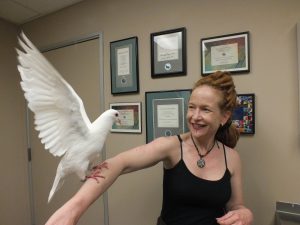Basics of Preventive Care for Pigeons and Doves
Providing your bird with a good diet, adequate sunlight (unfiltered by glass), and sufficient space and opportunity for exercise are the basics of insuring good health for your pigeons or doves. In addition to this, monitoring your birds’ weight with a gram scale and preventive care against parasites and canker (trichomoniasis) are a necessary part of keeping your birds feeling their best. The type and frequency of preventive care that is appropriate for your bird will depend on its living situation and should be determined in partnership with your trusted avian vet.
Pigeons and doves are both prone to developing canker, and I recommend treating for it a minimum of twice per year, even if there are no visible signs that canker is present. Trichomonads (the organisms that cause canker) are normal inhabitants of the digestive tracts of pigeons and doves, and even minor stresses such as molting or egg laying can allow for them to develop into a disease-causing state.
Common treatments for canker include Metronidazole, Ronidazole, Spartrix (Carnidazole), Seconidazole , and Dimetridazole (Emtryl.) Combination medications such as Ronsec (Ronidazole/Secnidazole) are particularly effective against difficult-to-treat canker strains. These products can be purchased online from trusted pigeon supply stores such as Jedds.
I recommend that you keep two different canker treatments on hand, and rotate their use, so that resistance does not develop. Birds that have depressed immune systems or who have a history of severe canker may require more frequent preventive treatment.
An often-overlooked aspect of avian health care is the prevention of parasites. Any bird that lives outdoors, or has frequent introduction to other birds, should be treated for parasites regularly. I highly recommend a product called Moxidectin Plus, which treats for all the commonly found worms in pigeons and doves, as well as treating for mites and biting flies. For outdoor birds, I would suggest using this product three times a year. Indoor birds can be treated initially, and unless they have contact with a source potential source of infection, generally do not need to be treated again.
Even indoor birds, however, can become hosts to mites, or to the very common feather louse. Moxidectin Plus will not eliminate feather lice, as they do not feed on the bird’s blood, but rather on it’s feathers. Regular spraying with mite spray for birds (I use Scalex) will help keep feather lice from becoming a problem. I generally spray my birds once a month, and spray their housing down each time that I thoroughly clean their cages.
Ideally, when treating for either canker of parasites, each bird will be treated individually, and the medication dose will be calculated by the bird’s weight. However, when an entire flock needs to be treated, this is sometimes difficult. Metronidazole, Ronidazole, and Moxidectin Plus are all available in a water-soluble form that can be added to the drinking water when treating multiple birds at once. It is best to avoid water-based treatment in extremely warm weather, when the birds may drink more water than they normally would.
Regular baths also help to keep feather parasites at bay, and the addition of avian bath salts to the bath water will leave your birds happy, soft, and smelling lovely. One of my favorite brands is Dr. Pigeon’s.
By Zoe Martell, Palomacy Volunteer Bird Health Care Coordinator


